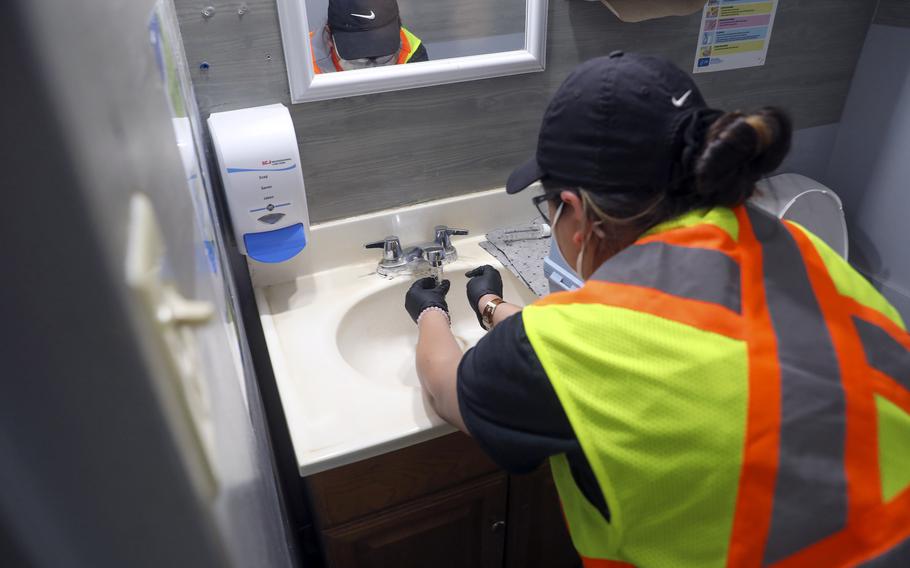
A Navy contractor collects a drinking water sample at Moanalua Preschool in Honolulu on Feb. 27, 2024. (Glenn Slaughter/U.S. Navy)
The Navy is expanding its analyses of water quality in its Hawaii distribution system after people complained last fall of lingering contamination, according to a report released Wednesday.
The Navy’s preliminary plumbing assessment, completed Feb. 24, examined water heaters and other fixtures in certain homes in military communities on the Navy’s water system for the Pearl Harbor area. The assessment also analyzed water in several hydrants and in one of the well shafts used to supply the system.
Analyses found no trace of jet fuel, which had contaminated the water system after leeching into the aquifer from a 2021 leak from the Red Hill Bulk Fuel Storage Facility on the outskirts of Honolulu.
That spill contaminated a well the Navy used to supply water to roughly 93,000 residents of military housing communities on and near Joint Base Pearl Harbor-Hickam.
Thousands of people temporarily relocated to area hotels as the Navy flushed the entire system.
Hundreds of affected individuals have filed suit in federal court seeking compensation for medical conditions and other hardships they say arise from the contamination.
Defense Secretary Lloyd Austin in March 2022 ordered the World War II-era facility permanently closed.
Some residents, however, complained last fall and early this year of a sheen on tap water poured into cups. Some have complained of unexplained rashes and other health problems.
The Hawaii Department of Education, which oversees a half-dozen schools on the Navy’s water system, wrote parents last week to say a state Health Department “review of 42 different compounds and screening parameters does not corroborate detection of petroleum in the system.”
The Navy had implemented “alternate laboratory procedures” and expanded a type of analysis that can identify traces of hydrocarbons, according to a Navy news release Wednesday.
Water samples taken last fall and tested by the Navy contained low levels of total petroleum hydrocarbon, or TPH, which refers to hundreds of compounds found in petroleum-based products.
The Navy’s preliminary assessment notes that TPH “are not common drinking water constituents” and that there “is no established drinking water standard for TPH.”
No sample, however, exceeded 266 parts per billion of TPH, which the Hawaii Department of Health uses as its safe drinking threshold, the preliminary assessment states.
The TPH did not originate from JP-5 jet fuel that had been stored at the Red Hill facility, the Navy said.
“Water sample results range from non-detect to low level detections, many observed near the limit of detection,” the preliminary assessment sates. “The sample chromatograms evaluated for advanced analysis of all premise plumbing samples were compared to chromatograms from known standards of JP-5 fuel and diesel fuel and they did not match.”
Samples from water heaters and plumbing fixtures “did not indicate a sheen or particulate matter consistent with JP-5, or biological growth,” according to the assessment.
The Navy “remains committed to determining the cause of TPH detections and will continue to closely coordinate with the [U.S. Environmental Protection Agency] and DOH to continue providing safe drinking water,” the assessment states.
The Navy announced last week that it was voluntarily extending water monitoring of its water distribution system by a year through April 2025.